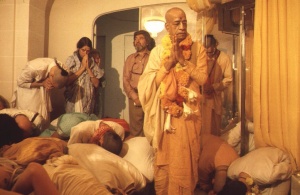CC Madhya 3.114 (1975)

A.C. Bhaktivedanta Swami Prabhupada
TEXT 114
- ki kahiba re sakhī ājuka ānanda ora
- cira-dine mādhava mandire mora
SYNONYMS
ki—what; kahiba—shall I say; re—O; sakhī—My dear friends; ājuka—today; ānanda—pleasure; ora—the limit; cira-dine—after many days; mādhava—Lord Kṛṣṇa; mandire—in the temple; mora—My.
TRANSLATION
Advaita Ācārya said, " 'My dear friends, what shall I say? Today I have received the highest transcendental pleasure. After many, many days, Lord Kṛṣṇa is in My house.' "
PURPORT
This is a song composed by Vidyāpati. Sometimes the word mādhava is misunderstood to refer to Mādhavendra Purī. Advaita Ācārya was a disciple of Mādhavendra Purī, and consequently some people think that He was referring to Mādhavendra Purī by using the word mādhava. But actually this is not the fact. This song was composed to commemorate the separation of Kṛṣṇa from Rādhārāṇī during Kṛṣṇa's absence in Mathurā. It is thought that this song was sung by Śrīmatī Rādhārāṇī when Kṛṣṇa returned. It is technically called Mathurā-viraha.